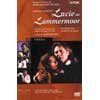Donizetti Lucie de Lammermoor
Donizetti’s own French edition of his popular opera is given a welcome outing
View record and artist detailsRecord and Artist Details
Composer or Director: Gaetano Donizetti
Genre:
DVD
Label: TDK
Magazine Review Date: 3/2004
Media Format: Digital Versatile Disc
Media Runtime: 145
Mastering:
Stereo
Catalogue Number: DV-OPLDL

Tracks:
| Composition | Artist Credit |
|---|---|
| Lucia di Lammermoor, '(The) Bride of Lammermoor' |
Gaetano Donizetti, Composer
Evelino Pidò, Conductor Gaetano Donizetti, Composer Ludovic Tézier, Enrico, Baritone Lyon Opera Chorus Lyon Opera Orchestra Marc Laho, Arturo, Tenor Nicolas Cavallier, Raimondo, Bass Patrizia Ciofi, Lucia, Soprano Roberto Alagna, Edgardo, Tenor |
Author: Alan Blyth
In 1839, Donizetti considerably altered his Lucia for Paris. For the rest of the 19th century, it was the regularly performed version of the work given in France. The major alterations concern the early part of the work. The tenor role of Normanno is converted into Gilbert and given a higher profile; indeed he is portrayed as an almost Iago-like character, the engine-room of the action. Then, incomprehensibly, Donizetti dropped the magical glass harmonica (or harp) introduction to the heroine’s famous ‘Regnava nel silenzio’, along with that aria itself, replacing them with a much more conventional and dull number. The character of Alisa is also eliminated. The other changes are more minor, mostly concerned with clarifying the plot.
In January 2002, Lyon Opera revived this score; Natalie Dessay, the Lucie, fell ill after a couple of nights and Patrizia Ciofi, scheduled for some performances, replaced her (though not before Virgin Classics made its CD recording with Dessay, 1/03). The production is a traditional one by the fashionable Caurier/Leiser team, with simple sets by Christian Fenouillat; mercifully there is no ‘Konzept’ such as was recently perpetrated on the Italian score at Covent Garden, so the singers are stage centre as they should rightfully be in such a work, though the prevailing darkness is a bit of a trial.
Ciofi throws her whole voice and being into portraying, sad, put-upon Lucie, turning her into something of a psychotic case right from the start, not only in the Mad Scene. Indeed I found her exaggerated body movement and facial distortions detracted from her accomplished if one-dimensional singing. She has all the notes and knows how to deploy them intelligently, but her tone is unvaried and monochrome as compared with great interpreters of the past. For all that, her Mad Scene, taken on her own terms, is something of a tour de force, all the better for omitting the long, inauthentic cadenza.
Alagna is almost at his involved and exciting best, happier – as ever – singing in French rather than Italian, though at times his voice sounds over-worked. Act 3, on this occasion, is far from being the anti-climax it can be, becomes a moving close to the work, and I hope I am not alone in thinking this finale has the best music in the whole piece. As Enrico, Tézier’s singing happily harks back to the elegant style of noted French baritones of the past: he is also an intense actor. Evelino Pido, now an experienced Donizettian, draws the best from ths score.
One or two moments of overloading apart, the sound is excellent with plenty of presence, Don Kent’s video direction is too keen on very close close-ups, unflattering to the cast, but is otherwise prompt and flexible.
In January 2002, Lyon Opera revived this score; Natalie Dessay, the Lucie, fell ill after a couple of nights and Patrizia Ciofi, scheduled for some performances, replaced her (though not before Virgin Classics made its CD recording with Dessay, 1/03). The production is a traditional one by the fashionable Caurier/Leiser team, with simple sets by Christian Fenouillat; mercifully there is no ‘Konzept’ such as was recently perpetrated on the Italian score at Covent Garden, so the singers are stage centre as they should rightfully be in such a work, though the prevailing darkness is a bit of a trial.
Ciofi throws her whole voice and being into portraying, sad, put-upon Lucie, turning her into something of a psychotic case right from the start, not only in the Mad Scene. Indeed I found her exaggerated body movement and facial distortions detracted from her accomplished if one-dimensional singing. She has all the notes and knows how to deploy them intelligently, but her tone is unvaried and monochrome as compared with great interpreters of the past. For all that, her Mad Scene, taken on her own terms, is something of a tour de force, all the better for omitting the long, inauthentic cadenza.
Alagna is almost at his involved and exciting best, happier – as ever – singing in French rather than Italian, though at times his voice sounds over-worked. Act 3, on this occasion, is far from being the anti-climax it can be, becomes a moving close to the work, and I hope I am not alone in thinking this finale has the best music in the whole piece. As Enrico, Tézier’s singing happily harks back to the elegant style of noted French baritones of the past: he is also an intense actor. Evelino Pido, now an experienced Donizettian, draws the best from ths score.
One or two moments of overloading apart, the sound is excellent with plenty of presence, Don Kent’s video direction is too keen on very close close-ups, unflattering to the cast, but is otherwise prompt and flexible.
Discover the world's largest classical music catalogue with Presto Music.

Gramophone Digital Club
- Digital Edition
- Digital Archive
- Reviews Database
- Full website access
From £8.75 / month
Subscribe
Gramophone Full Club
- Print Edition
- Digital Edition
- Digital Archive
- Reviews Database
- Full website access
From £11.00 / month
Subscribe
If you are a library, university or other organisation that would be interested in an institutional subscription to Gramophone please click here for further information.




